
1
The more I know of the world, the more I am convinced that I shall never see a man whom I can really love. I require so much!Jane Austen

2
If I could but know his heart, everything would become easy.Jane Austen
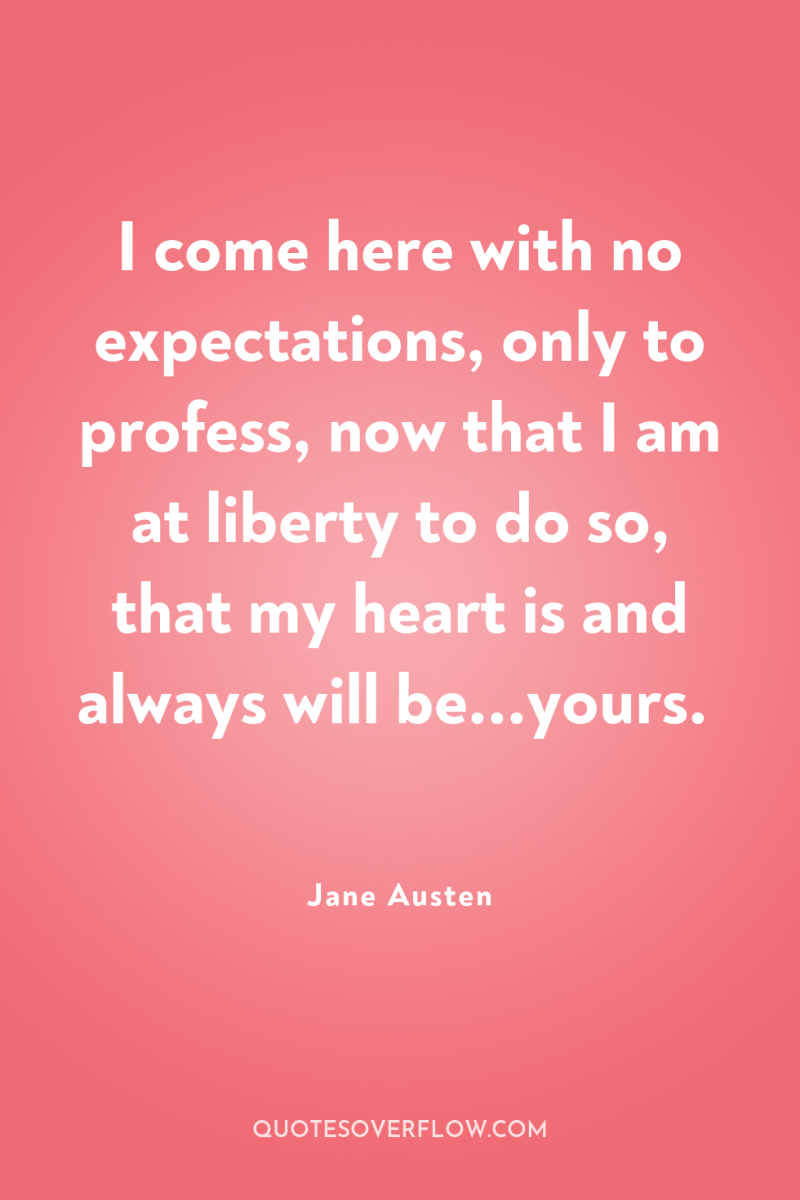
3
I come here with no expectations, only to profess, now that I am at liberty to do so, that my heart is and always will be...yours.Jane Austen
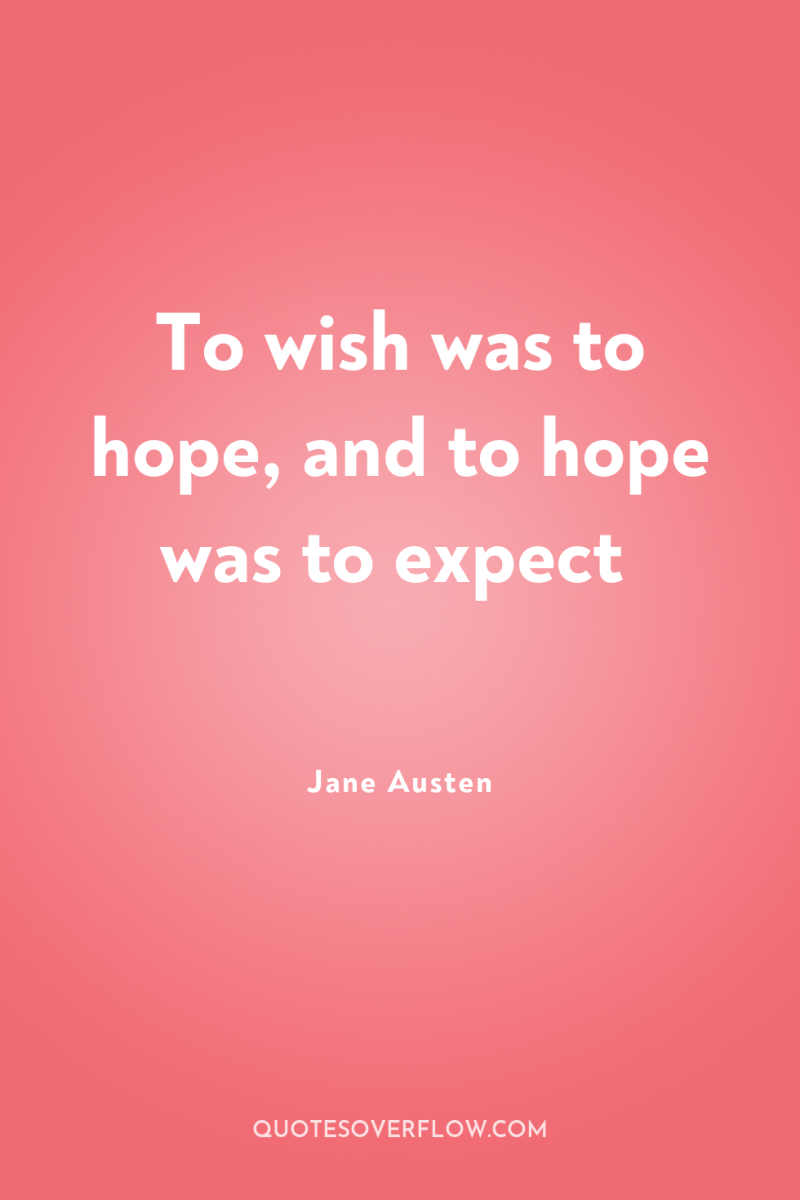
4
To wish was to hope, and to hope was to expectJane Austen
5
But to appear happy when I am so miserable – Oh! who can require it?Jane Austen
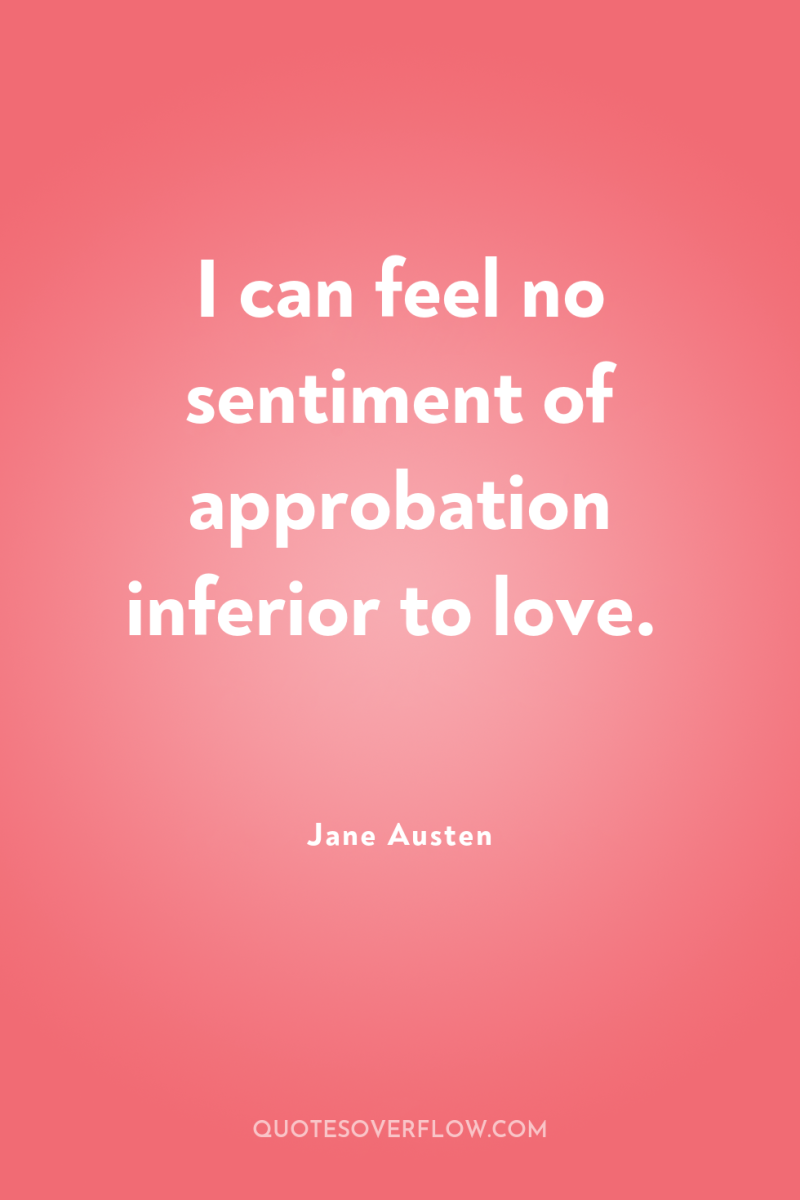
6
I can feel no sentiment of approbation inferior to love.Jane Austen
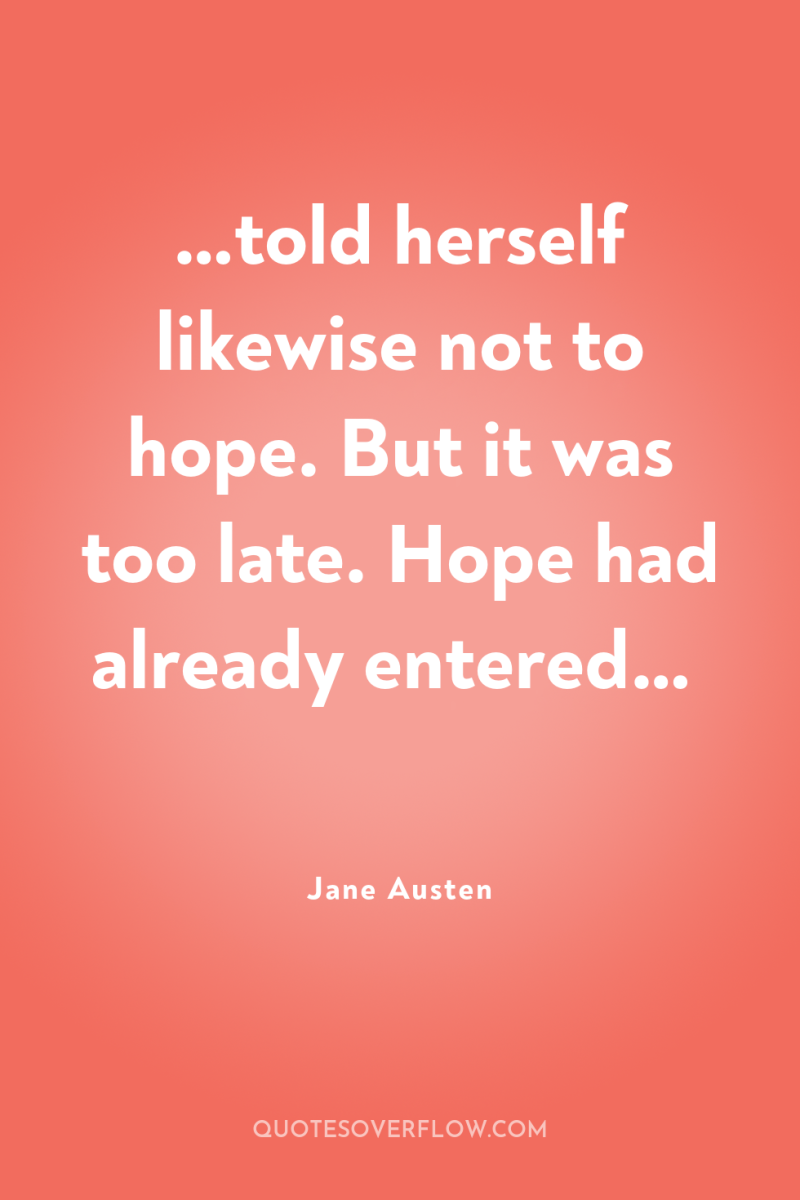
7
…told herself likewise not to hope. But it was too late. Hope had already entered…Jane Austen
8
It is not time or opportunity that is to determine intimacy;–it is disposition alone. Seven years would be insufficient to make some people acquainted with each other, and seven days are more than enough for others.Jane Austen

9
If a book is well written, I always find it too short.Jane Austen
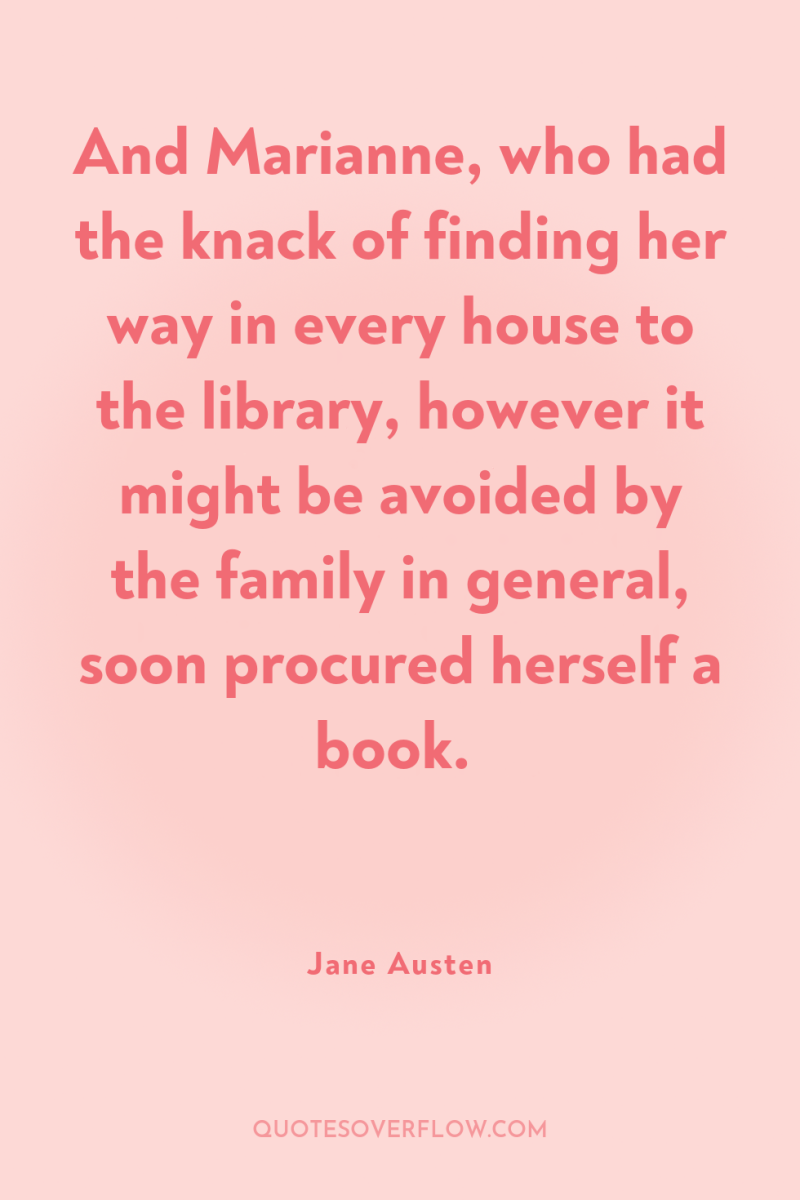
10
And Marianne, who had the knack of finding her way in every house to the library, however it might be avoided by the family in general, soon procured herself a book.Jane Austen
11
You are in a melancholy humour, and fancy that any one unlike yourself must be happy. But remember that the pain of parting from friends will be felt by every body at times, whatever be their education or state. Know your own happiness. You want nothing but patience – or give it a more fascinating name, call it hope.Jane Austen

12
To wish was to hope, and to hope was to expect.Jane Austen
13
... and because they were fond of reading, she fancied them satirical: perhaps without exactly knowing what it was to be satirical; but that did not signify. It was censure in common use, and easily given.Jane Austen
14
Elinor agreed to it all, for she did not think he deserved the compliment of rational opposition.Jane Austen
15
Every line, every word was -- in the hackneyed metaphor which their dear writer, were she here, would forbid -- a dagger to my heart. To know that Marianne was in town was -- in the same language -- a thunderbolt. -- Thunderbolts and daggers! -- what a reproof would she have given me! -- her taste, her opinions -- I believe they are better known to me than my own, -- and I am sure they are dearer.Jane Austen
16
Her family had of late been exceedingly fluctuating. For many years of her life she had had two sons; but the crime and annihilation of Edward a few weeks ago, had robbed her of one; the similar annihilation of Robert had left her for a fortnight without any; and now, by the resurrection of Edward, she had one again.Jane Austen
17
Between Barton and Delaford, there was that constant communication which strong family affection would naturally dictate;–and among the merits and the happiness of Elinor and Marianne, let it not be ranked as the least considerable, that though sisters, and living almost within sight of each other, they could live without disagreement between themselves, or producing coolness between their husbands.Jane Austen
18
I have not known him long indeed, but I am much better acquainted with him than I am with any other creature in the world.Jane Austen
19
Esteem him! Like him! Cold-hearted Elinor! Oh! worse than cold-hearted! Ashamed of being otherwise. Use those words again, and I will leave the room this moment.Jane Austen
20
On every formal visit a child ought to be of the party, by way of provision for discourse. In the present case it took up ten minutes to determine whether the boy were most like his father or mother, and in what particular he resembled either, for of course every body differed, and every body was astonished at the opinion of the others.Jane Austen
21
And here is my sweet little Annamaria, ’ she added, tenderly caressing a little girl of three years old, who had not made a noise for the last two minutes; ‘And she is always so gentle and quiet– Never was there such a quiet little thing! ’ But unfortunately in bestowing these embraces, a pin in her ladyship’s head dress slightly scratching the child’s neck, produced from this pattern of gentleness such violent screams, as could hardly be outdone by any creature professedly noisy. The mother’s consternation was excessive; but it could not surpass the alarm of the Miss Steeles, and every thing was done by all three, in so critical an emergency, which affection could suggest as likely to assuage the agonies of the little sufferer. She was seated in her mother’s lap, covered with kisses, her wound bathed with lavender-water, by one of the Miss Steeles, who was on her knees to attend her, and her mouth stuffed with sugar plums by the other. With such a reward for her tears, the child was too wise to cease crying. .Jane Austen
22
She was stronger alone…Jane Austen
23
I could not be happy with a man whose taste did not in every point coincide with my own. He must enter in all my feelings; the same books, the same music must charm us both.Jane Austen
24
In such moments of precious, invaluable misery, she rejoiced in tears of agony...Jane Austen
25
If, however, I am allowed to think that you and yours feel an interest in my fate and actions, it may be the means–it may put me on my guard–at least, it may be something to live for.Jane Austen
26
Marianne had now been brought by degrees, so much into the habit of going out every day, that it was become a matter of indifference to her, whether she went or not: and she prepared quietly and mechanically for every evening's engagement, though without expecting the smallest amusement from any, and very often without knowing, till the last moment, where it was to take her.Jane Austen
27
Before the house-maid had lit the fire the next day, or the sun gained any power over the cold, gloomy morning in January, Marianne, only half dressed, was kneeling against one of the window-seats for the sake of all the little light she could command from it, and writing as fast as a continual flow of tears would permit her.Jane Austen
28
He then departed, to make himself still more interesting, in the midst of an heavy rain.Jane Austen
29
Elinor had some difficulty here to refrain from observing, that she thought Fanny might have borne with composure, an acquisition of wealth to her brother, by which neither she nor her child could be possibly impoverished.Jane Austen
30
Marianne could never love by halves; and her whole heart became, in time, as much devoted to her husband, as it had once been to Willoughby.Jane Austen
31
Everybody pretends to feel and tries to describe with the taste and elegance of him who first defined what picturesque beauty was. I detest jargon of every kind, and sometimes I have kept my feelings to myself, because I could find no language to describe them in but what was worn and hackneyed out of all sense and meaning.Jane Austen
32
In books too, as well as in music, she courted the misery which a contrast between the past and present was certain of giving.Jane Austen
33
I understand you.– You do not suppose that I have ever felt much.– For four months, Marianne, I have had all this hanging on my mind, without being at liberty to speak of it to a single creature; knowing that it would make you and my mother most unhappy whenever it were explained to you, yet unable to prepare you for it in the least.– It was told me, –it was in a manner forced on me by the very person herself, whose prior engagement ruined all my prospects; and told me, as I thought, with triumph.– This person's suspicions, therefore, I have had to oppose, by endeavouring to appear indifferent where I have been most deeply interested;–and it has not been only once;– I have had her hopes and exultation to listen to again and again.– I have known myself to be divided from Edward for ever, without hearing one circumstance that could make me less desire the connection.– Nothing has proved him unworthy; nor has anything declared him indifferent to me.– I have had to contend against the unkindness of his sister, and the insolence of his mother; and have suffered the punishment of an attachment, without enjoying its advantages.– And all this has been going on at a time, when, as you know too well, it has not been my only unhappiness.– If you can think me capable of ever feeling–surely you may suppose that I have suffered NOW. The composure of mind with which I have brought myself at present to consider the matter, the consolation that I have been willing to admit, have been the effect of constant and painful exertion;–they did not spring up of themselves;–they did not occur to relieve my spirits at first.– No, Marianne.–THEN, if I had not been bound to silence, perhaps nothing could have kept me entirely–not even what I owed to my dearest friends–from openly shewing that I was VERY unhappy.Jane Austen
34
I cannot, I cannot, ' cried Marianne; 'leave me, leave me, if I distress you; leave me, hate me, forget me! But do not torture me so. Oh! how easy for those who have no sorrow of their own to talk of extertion!Jane Austen
35
For though a very few hours spent in the hard labour of incessant talking will dispatch more subjects than can really be in common between any two rational creatures, yet with lovers it is different. Between them no subject is finished, no communication is ever made, till it has been made at least twenty times over.Jane Austen
36
What do you know of my heart? What do you know of anything but your own suffering. For weeks, Marianne, I've had this pressing on me without being at liberty to speak of it to a single creature. It was forced on me by the very person whose prior claims ruined all my hope. I have endured her exultations again and again whilst knowing myself to be divided from Edward forever. Believe me, Marianne, had I not been bound to silence I could have provided proof enough of a broken heart, even for you.Jane Austen
37
Eleanor went to her room "where she was free to think and be wretched.Jane Austen
38
…Elinor was then at liberty to think and be wretched.Jane Austen
39
She felt the loss of Willoughby's character yet more heavily than she had felt the loss of his heart.Jane Austen
40
He had just compunction enough for having done nothing for his sisters himself, to be exceedingly anxious that everybody else should do a great deal.Jane Austen
41
...the pleasantness of an employment does not always evince its propriety.Jane Austen
42
He paid her only the compliment of attention; and she felt a respect for him on the occasion, which the others had reasonably forfeited by their shameless want of taste.Jane Austen
43
To avoid a comparative poverty, which her affection and her society would have deprived of all its horrors, I have, by raising myself to affluence, lost everything that could make it a blessing.Jane Austen
44
For though a very few hours spent in the hard labor of incessant talking will dispatch more subjects that can really be in common between two rational creatures, yet for the lovers is different. Between them no subject is finished; no communication is ever made, till it has been made at least twenty times over.Jane Austen
45
But it was a matter of great consolation to her, that what brought evil to herself would bring good to her sister; and Elinor, on the other hand, suspecting that it would not be in her power to avoid Edward entirely, comforted herself by thinking, that though their longer stay would therefore militate against her own happiness, it would be better for Marianne than an immediate return into Devonshire.Jane Austen
46
Marianne would have thought herself very inexcusable had she been able to sleep at all the first night after parting from Willoughby. She would have been ashamed to look her family in the face next morning, had she not risen from her bed in more need of repose than when she lay down in it.Jane Austen
47
One must not expect every thing.Jane Austen
48
When shall I cease to regret you! — When learn to feel a home elsewhere! — Oh! Happy house, could you know what I suffer in now viewing you from this spot, from whence perhaps I may view you no more! — And you, ye well-known trees! — but you will continue the same. — No leaf will decay because we are removed, nor any branch become motionless although we can observe you no longer! — No; you will continue the same; unconscious of the pleasure or the regret you occasion, and insensible of any change in those who walk under your shade! — But who will remain to enjoy you? .Jane Austen
49
Marianne, who had the knack of finding her way in every house to the library, however it might be avoided by the family in general, soon procured herself a book.Jane Austen
50
From a night of more sleep than she had expected, Marianne awoke the next morning to the same consciousness of misery in which she had closed her eyes.Jane Austen